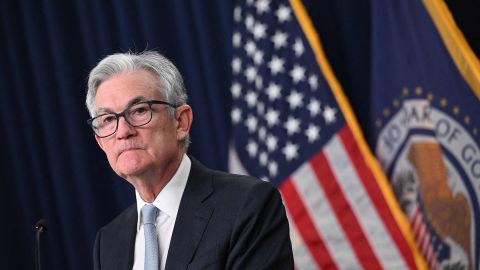As the United States prepares for pivotal midterm elections, a raft of conflicting headlines — layoffs at Big Tech, volatile stock markets, a central bank hell-bent on bringing the pain to tackle inflation — are muddying the answer to a simple question: Is the economy improving?
Maybe. Maybe not. If you’re frustrated by that, you’re not alone.
Job market just won’t budge
On the jobs front, there’s great news for anyone looking for work. The US economy added 261,000 jobs in October, about 60,000 more than economists had expected. Unemployment remains at a historically low 3.7%, and there are nearly two open jobs for every one person looking.
But that tightness in the labor market is bad news for the Federal Reserve, which worries that the easier it is for workers to press for higher wages, the harder it will be to tamp down prices that have remained stubbornly high for more than a year. By aggressively hiking interest rates, the Fed has sought to introduce some slack into a tight labor market. Slack, meaning less job growth, less wage growth or even layoffs.
“The Fed is likely frustrated,” wrote Rucha Vankudre, a senior economist for Lightcast.
It’s like when you put money in a vending machine only to have it eat your change and withhold your snack, Vankudre says. “You put money in, and the food moved a little bit but it didn’t fall. And then you kicked it and put more money in, and it still didn’t fall. It kind of feels like what the Fed is doing.”
Housing nightmare
Rather than getting what it wants — a slowdown in inflation — the Fed’s rate hikes are, for now, just making things harder on cash-strapped Americans. Inflation remains high, but now it’s also far more expensive to take out loans or pay off credit cards. And the Fed’s actions are wreaking havoc on economies overseas by strengthening the value of the US dollar, the cornerstone of international commerce.
US mortgage rates, which are indirectly influenced by the federal funds rate, soared to 7% last week for the first time in 20 years. (The average on the 30-year fixed rate fell slightly this week, to 6.95%. That’s still more than double where it was a year ago.)

Combined with low inventory, that’s turned the housing market into a nightmare both for buyers and sellers.
Prospective buyers are finding few homes they can afford. Sellers are unmotivated to list, in part because even if they find a buyer, they’d face historically high prices and low inventory when they go to look for a new place to live.
That’s been especially hard on younger first-time buyers who don’t have the equity or savings to shell out on a home. The result is they are renting for longer, and that’s helping push rental prices up.
Layoffs hit Big Tech
A painful round of layoffs and hiring freezes are hitting workers at some of Silicon Valley’s premier companies, a worrying sign that a recession may be on the horizon. Elon Musk began laying off employees across Twitter on Thursday; Lyft announced it was cutting 13% of its staff; and Microsoft and Amazon are freezing corporate hires.
Of course, tech companies are not indicative of the broader labor market, economists warn. Many of them grew rapidly in the pandemic era, and are now scaling back as advertisers rethink spending and demand cools.
“There’s no question there are high-profile Silicon Valley layoffs, but overall the tech sector is still healthy and adding jobs,” wrote Bledi Taska, chief economist for Lightcast. “The narrative doesn’t always match the numbers.”
Pandemic fallout
The economic pain we’re living with now is rooted in the pandemic’s uniquely devastating impact. In 2020, the virus forced an abrupt shutdown that, even two and a half years on, is still rippling through the global economy.
Demand for goods shot up at the same time supply chains were buckling. That caused a cascade of shortages on everything from toilet paper to computer chips. Prices went up. Consumers stuck inside their homes used their government stimulus checks to buy up more stuff, feeding inflationary pressures. Then Russia invaded Ukraine, bringing supply chains to their breaking point yet again and exacerbating global food shortages.
The Fed, meanwhile, kept interest rates near zero and invested heavily in bonds to keep financial markets from imploding. Throughout 2021, Fed officials played down rising inflation as a “transitory” effect that would, eventually, work itself out.
It didn’t. And now the Fed is playing an aggressive game of catch-up to prevent price surges from becoming entrenched in a vicious cycle.
Despite some tentative signs of cooling — the Consumer Price Index hit 9.1% June and has since dropped to 8.2% (still wildly higher than the Fed’s 2% goal) — prices are unlikely to come down overnight.
So what does it all mean?
All of this points to a difficult puzzle for Democrats trying to hold on to power in next week’s midterms.
Even though the US economy is not, technically, in a recession, nearly 75% of likely voters in a recent CNN poll said they feel as though it is.
Wages are up, but not enough to take the sting off high prices of necessities like food, fuel and shelter.
For those invested in stocks, it’s not been a great year, either, and that’s especially hard on retirees who are living off their investments.
Economists will get fresh insight into the state of inflation next week with the October CPI reading on Thursday. But if there’s good news in that report, it will have come two days too late to sway voters one way or another.
Is the economy improving? Days before the midterms, no one has a good answer - CNN
Read More
No comments:
Post a Comment